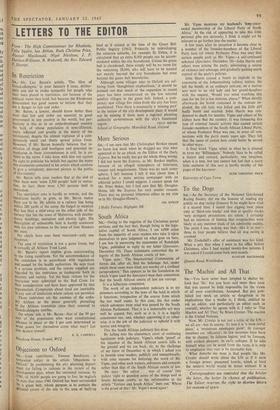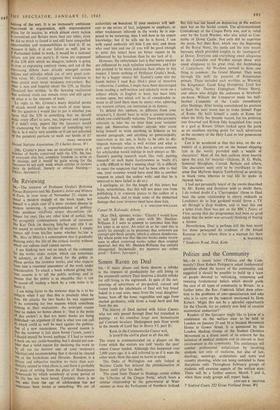The 'Machin' and All That
SIR,—You have never been tempted to shelter be- hind that 'Sir,' but you have said more than once that you cannot be held responsible for the views of all your contributors. Accepted. But you pub- lished last week an article so dangerous in its implications that a reader is, I think, entitled to ask an editor, and particularly an editor such as yourself, whether he agrees with it. I refer to 'The Machin and All That,' by Brian Crozier. The machin is the United Nations.
Now, Mr. Crozier is not just a critic of the UN— we all are—but its enemy. To him it is 'a most sinful place,' a 'monstrous misshapen giant'; its younger members are 'offensive; its few successes have been due to chance; its failures legion; and he foresees, with evident pleasure, its early collapse. If he asks himself what can be saved from the ruins, it is only to emphasise that ruin is its inevitable fate.
What disturbs me most is that people like Mr. Crozier should write about the UN as if it were
a foreign power, presumed hostile, which at least the western world would be better without. It is
nothing of the sort. It is an immensely ambitious experiment in organisation, with unprecedented prizes for its success, to which almost every nation is committed and Britain more than any other, since We did so much to found it and still have unequalled opportunities and responsibilities to lead it. If on ?cession it fails, it is our failure as well; just as If Parliament failed to work, it would be a national failure, not just one party's. If views are expressed at the UN with which we disagree, nobody is going to stop us expressing contrary views, and out of the continuing debate have already emerged certain actions and attitudes which are of very great corn- lnon value. Mr. Crozier, supposes that weakness in some places must mean weakness everywhere. But What is new and hopeful about the UN, as Harlan Cleveland has written, 'is the dawning realisation that national rivals can remain rivals and still agree cle what is in the interests of both.'
To reply to Mr. Crozier's many detailed points of attack would take up too much of your space. but the question I would like to put is whether you agree that the UN is something that we should make every effort to save, use, improve and expand. If it didn't exist, papers like the Spectator would be clamouring for the creation of something very like it. Is it really very sensible or (I am not ashamed of the paradox) patriotic to wash our hands of it?
NIGEL NICOLSON United Nations Association, 25 Charles Street, WI
[Mr. Crozier's piece was an excellent review of a num ber of books concerned with the UN. He has, as everyone else has, complete freedom to write as he chooses, and it would be quite wrong for the Spectator to say each week which articles or reviews car, ry its political, literary or critical blessing.— Editor, tor, Spectator.]







































 Previous page
Previous page